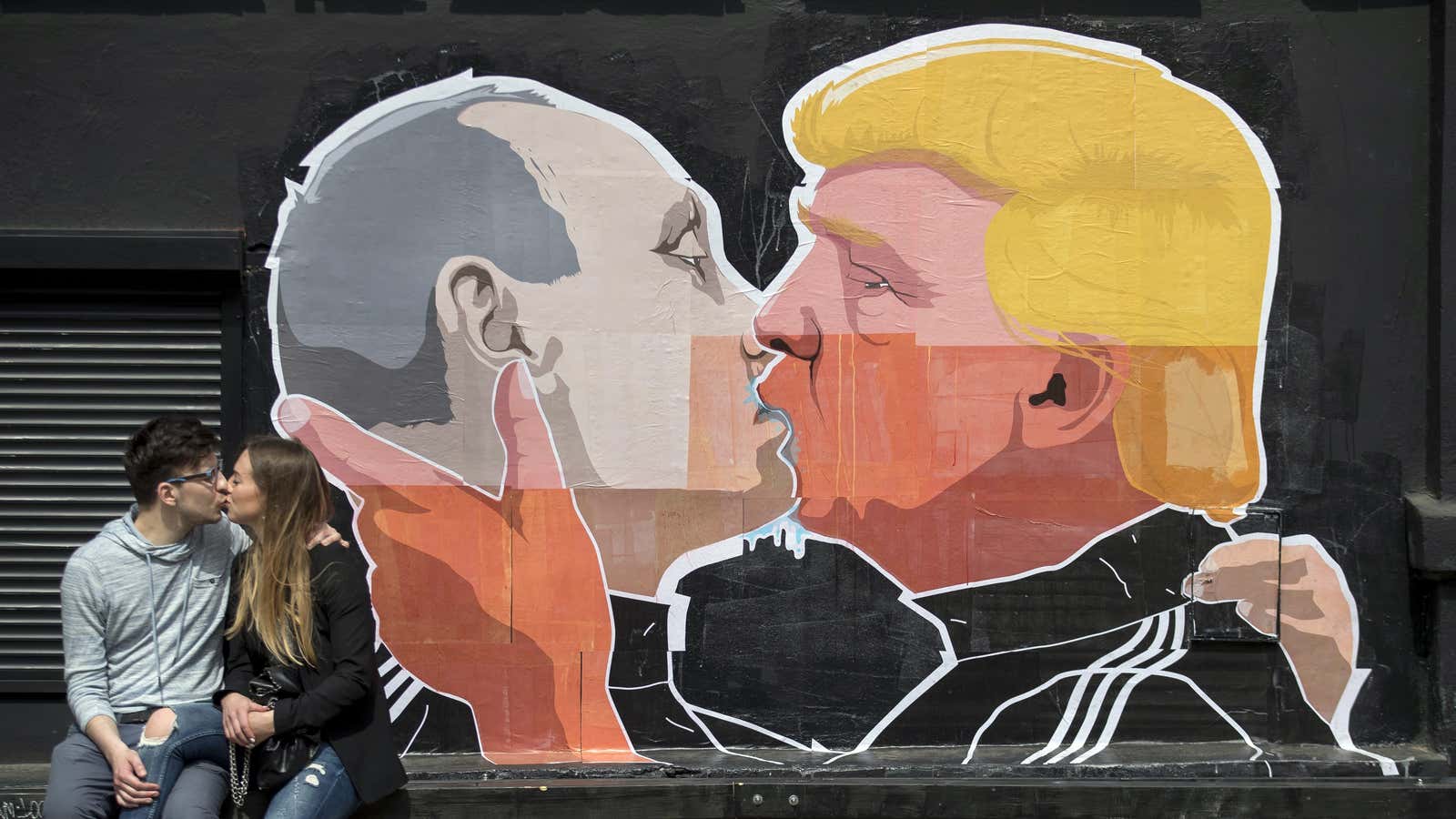The budding bromance between Donald Trump and Russian President Vladimir Putin has been one of this election’s most bizarre subplots. But take a closer look at the Russian media’s portrayal of Trump, plus the allegedly Kremlin-linked hacks that have hit both Trump and Clinton, and the Kremlin doesn’t seem all that fond of the Republican candidate. Moscow does, however, seem to be enjoying the damage Trump is doing to America’s image.
Let’s first clear up the “great things” that Putin has supposedly said about Trump. At a recent town hall, both Trump and NBC host Matt Lauer said Putin had called him “brilliant.” But as Politifact reports, the word Putin used (‘яркий’) actually translates as “colorful” or “flamboyant”–not the same thing as “brilliant.” As for Trump claiming the Russian leader has called him a “genius,” Politifact doesn’t find any evidence of that.
If Putin wanted a president Trump, you’d expect regular laudatory pieces in the Russian media. But analysts say in-depth positive character portraits of the billionaire have been few and far between. Instead, reports use soundbites from Trump that either back up the Kremlin’s geopolitical worldview or damn Hillary Clinton, who shares a rocky past with the Russian strongman, say Russian media experts Aleksey Kovalev, a Russian journalist and media blogger, and Kevin Rothrock, Russia editor for Global Voices, a non-profit that analyzes international media.
“It’s not so much pro-Trump as it is anti-Hillary. The ‘enemy of my enemy is my friend’ logic is very strong here,” said Kovalev, who runs a Russian language blog that dissects the country’s media.
Instead, they say reports cover Trump the way they cover fringe European candidates like Marine Le Pen in France or Geert Wilders in the Netherlands–as evidence that the West is in chaos. ”They’re just using Trump to probably remind the public that Russia is actually respected and understood…it seems to me that they don’t think that Trump is going to win, otherwise they would be doing more about his character,” Rothrock said. Comments by Trump that normalize Russia’s worldview, like reducing the power of NATO and espousing a ‘realpolitik’ foreign policy, get particular play.
Russia experts are divided on whether or not Putin wants Trump to win, as he weighs up the advantages of the ‘devil-you-know’, predictable nature of Clinton, versus ‘wildcard’ Trump, who often speaks in support of Russia but poses a host of other threats. He has, for instance, said Russian planes approaching US military assets should be shot from the sky and suggested both South Korea and Japan should have nuclear weapons.
Nonetheless, the Kremlin likely loves how Trump makes America look less attractive to a Russian audience, particularly when public enthusiasm for Putin is waning. “It’s great for them – it weakens Clinton, it makes America look bizarre and faintly scary, and it’s a source of useful soundbites,” says Mark Galeotti, senior research fellow at the Institute of International Relations Prague. “They use Trump to tell the Russian public, ‘Look, this is what the West is like–it’s no better, it’s got philanderers and bizarrely coiffed imbeciles at its fore.’”
Trump is a figure of fun in spheres traditionally more sympathetic to the West like Moscow intellectuals, says Nina Khrushcheva, a Russian professor of international affairs at The New School in New York. “He’s mocked incessantly,” she said. “Especially among liberals of my type, they say, ‘America always lectures us on how we tolerate Putin and look at you, you are electing Trump, which is the most embarrassing thing America could have come up with.’”
The allegedly Russian-backed hacks that have harmed both candidates are not meant to tip the US election, but to make American democracy look chaotic and unreliable. “It’s America that they need to smear rather than any one character,” said Peter Pomerantsev, a senior fellow at the Legatum Institute think tank in London. ”I don’t think Putin’s that crazy to think he can affect the US elections directly. What I think their narrative is – and they’re using hacking to do–is to smear democracy.”
The hacks are also meant to weaken Clinton, who most in Moscow think will win the election, said Galeotti.”They’re hoping to ensure that when she does come into the presidency, she will already have some blows struck against her–she will be dealing with a much more fractious, a much more divided, Democratic party,” he said.
And the hacks serve to demonstrate Russia’s power. They are payback for what the Kremlin sees as CIA meddling in Russian politics and in Ukraine, said Gustav Gressel, a senior policy fellow at the European Council on Foreign Relations in Berlin. “It doesn’t mean they bet on Trump to win or want Trump to win,” he said.
“It’s to say ‘Look, we can do that as well, look, we have the capabilities, we can meddle in your domestic affairs, so either we can both learn from that or we will be there on the spot.’”
